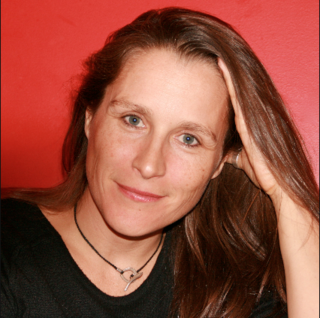Related Research Articles

The AIDS epidemic, caused by HIV, found its way to the United States between the 1970s and 1980s, but was first noticed after doctors discovered clusters of Kaposi's sarcoma and pneumocystis pneumonia in homosexual men in Los Angeles, New York City, and San Francisco in 1981. Treatment of HIV/AIDS is primarily via the use of multiple antiretroviral drugs, and education programs to help people avoid infection.

Bedford Hills Correctional Facility for Women, a women's prison in the town of Bedford, New York, is the largest New York State women's prison. The prison previously opened under the name Westfield State Farm in 1901. It lies just outside the hamlet and census-designated place Bedford Hills, New York.

Kathy Boudin was an American radical leftist who served 23 years in prison for felony murder based on her role in the 1981 Brink's robbery. Boudin was a founding member of the militant Weather Underground organization, which engaged in bombings of government buildings to express opposition to U.S. foreign policy and racism. The 1981 robbery resulted in the killing of two Nyack, New York, police officers and one security guard, and serious injury to another security guard; Boudin was arrested attempting to flee after the getaway vehicle she occupied was stopped by police. She was released on parole in 2003. After earning a doctorate, Boudin became an adjunct professor at Columbia University.
Prison rape commonly refers to the rape of inmates in prison by other inmates or prison staff. In 2001, Human Rights Watch estimated that at least 4.3 million inmates had been raped while incarcerated in the United States. A United States Department of Justice report, Sexual Victimization in Prisons and Jails Reported by Inmates, states that "In 2011–12, an estimated 4.0% of state and federal prison inmates and 3.2% of jail inmates reported experiencing one or more incidents of sexual victimization by another inmate or facility staff in the past 12 months or since admission to the facility, if less than 12 months." However, advocates dispute the accuracy of the numbers, saying they seem to under-report the real numbers of sexual assaults in prison, especially among juveniles.
Elizabeth Glaser was an American AIDS activist and child advocate married to actor and director Paul Michael Glaser. She contracted HIV very early in the AIDS epidemic after receiving an HIV-contaminated blood transfusion in 1981 while giving birth. Like other HIV-infected mothers, Glaser unknowingly passed the virus to her infant daughter, Ariel, who died in 1988.
Kimberly Ann Bergalis was an American woman who was one of six patients purportedly infected with HIV by dentist David J. Acer, who was infected with HIV and died of AIDS on September 3, 1990.
AIDS-defining clinical conditions is the list of diseases published by the Centers for Disease Control and Prevention (CDC) that are associated with AIDS and used worldwide as a guideline for AIDS diagnosis. CDC exclusively uses the term AIDS-defining clinical conditions, but the other terms remain in common use.
Judith Alice Clark, known as Judy Clark, is a US far-left radical activist, formerly a member of the Weather Underground and the May 19th Communist Organization (M19). Her mother was the researcher Ruth Clark. In 1967, she took up studies at the University of Chicago, where she joined Students for a Democratic Society (SDS) and later co-founded the Weather Underground, participating in the Days of Rage. She went underground, was arrested and briefly incarcerated; afterwards she lived in New York City, co-founding M19. In the early 1980s, M19 linked with the Black Liberation Army (BLA) as The Family in order to carry out bank robberies to support revolutionary struggle. Clark was arrested driving a getaway car after the October 1981 Brink's robbery in Nanuet, New York, in which a security guard and two Nyack, New York police officers were shot and killed.
The CDC Classification System for HIV Infection is the medical classification system used by the United States Centers for Disease Control and Prevention (CDC) to classify HIV disease and infection. The system is used to allow the government to handle epidemic statistics and define who receives US government assistance.

The New York State Department of Corrections and Community Supervision (NYSDOCCS) is the department of the New York State government that administers the state prison and parole system, including 44 prisons funded by the state government.
A prison nursery is a section of a prison that houses incarcerated mothers and their very young children. Prison nurseries are not common in correctional facilities in the United States, although prior to the 1950s many states had them and they are widespread throughout the rest of the world.
David J. Acer was an American dentist who allegedly infected six of his patients, including Kimberly Bergalis, with HIV. The Acer case is considered the first documented HIV transmission from a healthcare worker to a patient in the United States, though the means of transmission remain unknown. The high-profile case led to public controversy regarding HIV testing and disclosure for healthcare workers.
HIV.gov, formerly known as AIDS.gov, is an internet portal for all United States federal domestic HIV and AIDS resources and information. On World AIDS Day, December 1, 2006, the U.S. Department of Health and Human Services launched AIDS.gov. The site contains content and links that guide users to their desired information.

Pernessa C. Seele is an American immunologist and interfaith public health activist. Seele is the CEO and founder of Balm in Gilead, Inc., a religious-based organization that provides support to people with AIDS and their families, as well as working for prevention of HIV and AIDS. In 1989 she initiated the Harlem Week of Prayer, with 50 churches, synagogues and mosques participating. This became an annual event and organizing force for the religious community to respond to the AIDS crisis.
The Women's Prison Association (WPA), founded 1845, is the oldest advocacy group for women in the United States. The organization has historically focused on New York City and New York State issues. Since 2004 it has developed the Institute on Women & Criminal Justice, to focus a national conversation on women and criminal justice.
Discrimination against people with HIV/AIDS or serophobia is the prejudice, fear, rejection, and stigmatization of people with HIV/AIDS. Marginalized, at-risk groups such as members of the LGBTQ+ community, intravenous drug users, and sex workers are most vulnerable to facing HIV/AIDS discrimination. The consequences of societal stigma against PLHIV are quite severe, as HIV/AIDS discrimination actively hinders access to HIV/AIDS screening and care around the world. Moreover, these negative stigmas become used against members of the LGBTQ+ community in the form of stereotypes held by physicians.
Agnes Gund is an American philanthropist and arts patron, collector of modern and contemporary art, and arts education and social justice advocate. She is President Emerita and Life Trustee of the Museum of Modern Art (MoMA) and Chairman of its International Council. She is a board member of MoMA PS1. In 1977, in response to New York City's fiscal crisis that led to budget cuts that virtually eliminated arts education in public schools, Gund founded Studio in a School, a nonprofit organization that engages professional artists as art instructors in public schools and community-based organizations to lead classes in drawing, printmaking, painting, collage, sculpture, and digital media, and to work with classroom teachers, administrators, and families to incorporate visual art into their school communities.
Infectious diseases within American correctional settings are a concern within the public health sector. The corrections population is susceptible to infectious diseases through exposure to blood and other bodily fluids, drug injection, poor health care, prison overcrowding, demographics, security issues, lack of community support for rehabilitation programs, and high-risk behaviors. The spread of infectious diseases, such as HIV and other sexually transmitted infections, hepatitis C (HCV), hepatitis B (HBV), and tuberculosis, result largely from needle-sharing, drug use, and consensual and non-consensual sex among prisoners. HIV and hepatitis C need specific attention because of the specific public health concerns and issues they raise.

Catherine Gund is an American producer, director, and writer who founded Aubin Pictures in 1996.
In the United States, prisons are obligated to provide health care to prisoners. Such health care is sometimes called correctional medicine. In women's prisons, correctional medicine includes attention to reproductive health.
References
- 1 2 3 4 5 6 7 8 Schulman, Sarah (2021). Let the Record Show: A Political History of ACT UP New York, 1987-1993 (1 ed.). New York, NY: Farrar ,Straus and Giroux. pp. 241–267, 398. ISBN 9780374185138.
- ↑ Day, Emma (27 April 2022). "The Fire Inside: Women Protesting AIDS in Prison since 1980". Modern American History. 5: 79–100. doi: 10.1017/mah.2022.3 . S2CID 248396244.
- ↑ Clark, Judy; Boudin, Kathy (1990). "Community of Women Organize Themselves to Cope with the AIDS Crisis: A Case Study from Bedford Hills Correctional Facility". Social Justice. 17 (2): 90–109. JSTOR 29766543 . Retrieved 5 May 2022.
- ↑ McGovern, Theresa (1994). "S.P. v. Sullivan: The Effort to Broaden the Social Security Administration's Definition of AIDS". Fordham Urban Law Journal. 21 (4): 1092. Retrieved 5 May 2022.
- ↑ Gund, Catherine; Levine, Debra (27 June 2018). "I'm You, You're Me (1992)". Aubin Pictures. Retrieved 12 January 2023.
- ↑ "Katrina Haslip Dies; AIDS Worker Was 33". The New York Times. 3 December 1992. Retrieved 5 May 2022.
- ↑ "Interactive AIDS Quilt". www.aidsmemorial.org.